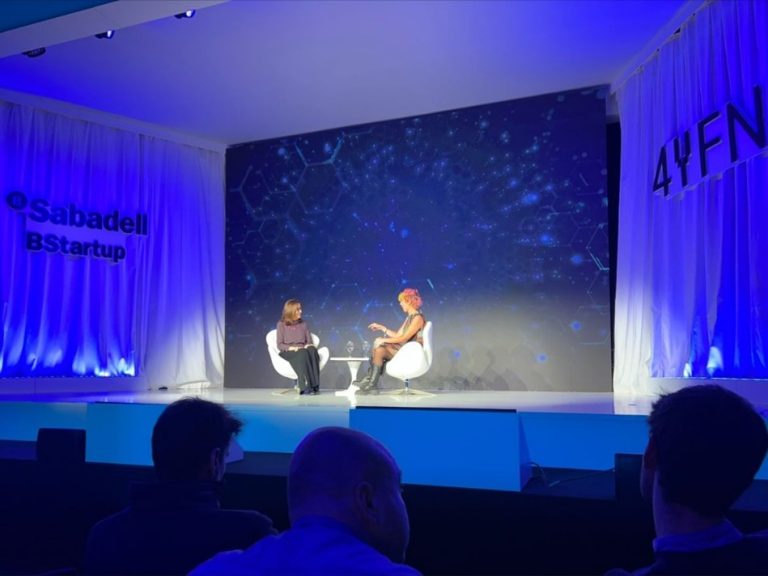
The ninth edition of the startup event 4YFN of the world’s largest exhibition for the mobile industry GSMA MWC (Mobile World Congress) took place in Barcelona last week. This year’s record-breaking attendance of nearly 100,000 global attendees, 780 companies and a thousand investors, bears testament to its significance in the industry.
This year’s showcase was truly captivating, from a hyperloop mock to robot dogs and smartphone innovations that defy the laws of physics. With inspiring talks, all-hands-on-deck workshops and the most innovative and hottest technologies, participants got to experience the FUTURE OF TECH.
This year’s edition was all about 5G Acceleration, Reality+. OpenNet and Digital Everything.

The entire ecosystem is benefiting from the untapped value unlocked by 5G. With millions of 5G devices and vast amounts of new data being collected, the way the world connects is being redefined. Mobile-led platforms are becoming even smarter through software development, digital innovation, and enhanced 5G delivery, leading to the creation of new use cases and business models that will transform industries and enterprises.
Huawei Carrier BG President, Li Peng, delivered a keynote speech at MWC on reimagining 5G coverage and reinventing 5G technologies and says
‘To achieve greater 5G success, the industry needs to reimagine 5G business, reinforce 5G coverage, and reinvent 5G technologies’

As such, some of the topics which animated discussions between Telco world leaders were:
– 5G: Modernize to Monetize
– Is a 5G Future for everyone?
– A Quantum Leap into the future
– Are private Networks over-rated
– etc.
The introduction of 5G networks has brought significant improvements to data speed, lower latency, and increased reliability. Customers can now access information and services more quickly, and the performance of real-time applications has improved. However, these improvements have also raised customer expectations, as they now expect a frictionless online customer experience with a quick response rate and the ability to communicate on all channels.
To meet these expectations, businesses need to implement a unified communication strategy that integrates all channels and provides a consistent experience across them. This requires not only the technology to support omnichannel communication but also the processes and training to ensure that agents can respond quickly and effectively on all channels. Overall, the increased hyperconnectivity of 5G networks is driving a shift towards omnichannel customer experience, which is essential for businesses to meet the evolving needs and expectations of their customers.
In terms of ‘Digital Everything’, the emergence of digital technologies offers a tremendous opportunity to generate value across all industries. Entertainment, manufacturing, and smart mobility are just a few examples of the rapidly changing challenges facing the industrial and enterprise sectors. The integration of digitalization, the Internet of Things (IoT), and the merging of the physical and digital worlds have transformed the game, enabling us to tackle these challenges and move towards Industry 4.0 and beyond.
With this at the core of all discussions on this theme, other areas were explored:
– Remote control: connecting an industrial revolution
– Delivery beyond speed
– Travel beyond speed
– etc.

With the emergence of digital technologies and Industry 4.0, customers have come to expect the perfect customer experience. Digital everything has transformed the way customers interact with businesses, and as a result, they expect personalized, convenient, and seamless experiences across all touchpoints. In fact, the rise of ‘Digital Everything’ has led to a blurring of the lines between the physical and digital worlds and customers now expect a seamless experience across both. This means that businesses need to be able to deliver a consistent and personalized experience to customers, regardless of whether they are interacting with them online or in person.

Generative AI was high on the agenda during the 4-day event. And ChatGBT and DALL-E were far from being in the spotlight as the unlocked power of GANs (Generative adversarial networks) stole the show.
Generative AI algorithms are powerful tools that can perform complex tasks, but they require an enormous amount of training data to do so effectively.
One crucial process in preparing this data is data annotation, which involves labelling and categorizing large datasets of various types of content, such as images, videos, audio, and texts. This process helps the AI system learn and recognize patterns in the data, which is essential for supervised or unsupervised machine learning. In other words, data annotation trains artificial intelligence to recognize and understand the content, making it usable for various applications.
Without data labellers, artificial intelligence systems would not be able to learn effectively, and the accuracy and effectiveness of AI tools would be severely limited.
Therefore, data annotation plays a critical role in the development and advancement of Generative AI.
The Nest by Webhelp can help you annotate, label, segment and enrich data to build and train artificial intelligence solutions:
As data and speed become commoditized in the telco industry, customer experience is becoming a key point of differentiation. While brands in the sector have traditionally prioritized functionality over experience, recent market entrants are raising the bar, creating a new “norm” for customer experience standards. To avoid falling behind, more traditional telcos must prioritize customer experience and re-evaluate their approach.
Customers are becoming increasingly hyperconnected, meaning they expect to be able to access products and services through a variety of channels and devices. They demand convenience and expect businesses to provide them with a seamless experience across all touchpoints, whether it’s through a website, mobile app, social media, or in-person interactions. As such, businesses must be easy to reach and responsive to meet the evolving needs and expectations of their customers. To provide a perfect customer experience, businesses must leverage digital technologies to enhance the quality of their services and prioritize omnichannel support to ensure customer convenience and accessibility. By meeting these expectations, businesses can gain a competitive advantage and differentiate themselves from their competitors.
Personalization has become crucial for telco companies as customers are increasingly demanding personalized experiences that are tailored to their individual needs and preferences. With the rise of digital technology and the availability of data, customers expect companies to use their data (only if consented) to provide them with more relevant and personalized experiences.
Across the industry, personalization can take many forms, such as personalized pricing plans, customized services, and tailored content recommendations. By leveraging customer data and preferences, telco companies can offer personalized services that cater to the specific needs of their customers.
Moreover, personalization has become essential for businesses to retain their customers and build long-term relationships with them. With the increasing competition in the telecom industry, businesses need to differentiate themselves from their competitors by providing a unique and personalized experience that meets the needs and expectations of their customers.
Content management plays a crucial role in delivering a personalized experience for customers. Personalization requires understanding the unique needs and preferences of each customer and delivering content and services that cater to those needs.[NB1] A robust content management system enables companies to create and manage content that is tailored to specific customer segments or even individual customers. Moreover, content management can help companies to deliver personalization at scale to drive growth and customer satisfaction.
For example, a telecom company can use a content management system to deliver personalized offers and promotions based on a customer’s purchase history or usage patterns. By leveraging customer data and analytics, telecom companies can create targeted campaigns that appeal to individual customers, leading to higher engagement and loyalty.
In addition, content management can help organizations to streamline their internal processes, enabling them to respond more quickly to customer needs and provide more timely and relevant services.
Overall, a robust content management system is critical for delivering personalized experiences. Companies that recognize the importance of personalization and invest in the right resources to support it will be better equipped to meet the evolving needs of their customers and gain a competitive advantage in the market.
Moreover, the concept of personalization or ‘individualize the experience’ had already been mentioned by Oliver Wyman as a pre-requisite for a next-level customer experience in telco.
Amongst others, ‘proactivity’ also seems to be an essential element to a successful CX. This implies that telco players should focus on proactively solving customer hassles. For instance, informing customers about planned maintenance could reduce failure demand for businesses (fewer calls to helplines), and dissatisfaction for customers (less time spent in call queues). Or even by anticipating customer questions (for example, if there is likely to be an abnormally high bill) and enabling agents to proactively reach out directly to customers.
Additionally, companies must also be proactive in addressing security concerns, particularly as the amount of data generated by 5G networks is expected to increase exponentially.

Today, the amount of data generated and handled by companies has increased significantly, making security a top priority. Companies that invest in robust security measures can protect their customers’ data from cyber threats, prevent fraudulent activities, and maintain the trust of their customers. On the other hand, those that fail to prioritize security may face severe consequences, including loss of customer trust, legal and financial penalties, and reputational damage.
On the customer experience side, telco companies can benefit from KYC services and alert management to protect their customers’ personal data.
At 4YFN startups discussed new models of growth such as ‘Balanced Growth: The New Scale-up paradigm’. With the ‘easy money’ time being over, startups face challenges such as maintaining their focus on their core purpose, flexibility, and agility.
Partnering with an outsourcing partner could support a startup in facing these particular challenges. Below are just some of the many reasons to do so:
During the event, some startups particularly caught our attention:
Factorial: the newest European unicorn, Factorial, is a human resources software that helps CEOs and HR pros streamline employee time tracking, time off management, performance and so much more in an all-in-one platform.
Holded: Holded is an online accounting, billing and invoicing software for freelancers and SMBs that enables users to create and send invoices, proformas and budgets, and keep all expenses controlled. Overall, it’s the solution in the cloud that has everything you need to manage your business – anytime, anywhere.
Cooltra: Cooltra offers the most flexible motorcycle and scooter rental service depending on your needs: by the minute, by the hour, by the day and by the month.
TaxDown: Taxdown is a platform that proposes an automated system to prepare, and optimize, personal income statements.
Eva Global: helps its customers to manage their electric vehicle charger infrastructure and provides superior customer experience to EV drivers. This startup’s services create new value and opportunities in the eMobility business.
Exoticca: Exoticca is a startup travel agency that offers luxury and exotic all-inclusive travel deals.
MundiMoto: offers a wide variety of fully reconditioned motorcycles with a 1-year warranty so bikers can enjoy the road like never before.
Simplr: Simplr is known for being the world’s first sustainable consumption channel that supports simply subscribing to products and services. In other words, anyone could subscribe to products such as a computer, a car, a barbecue, use it and return it whenever they want.

Last but not least, Helena Guardans, president of Webhelp Spain during the ‘Founder Series: Lessons from a career disrupting customer service’ shared her insights and lessons learned from a career of being a founder and leader in a male-dominated industry.
Her entrepreneurial journey and leadership in the customer service industry are a true testament to her innovation and determination. With over two decades of experience in the field, Helena has helped drive the evolution of customer service and has been a key player in its positive disruption.
As well as explaining her journey, Helena shared crucial advice for all startups present at 4YFN that are trying to find their market fit:
‘The idea for a project is OK but it’s not enough. Set up robust processes and procedures, so that the company ‘works’ without the founder being involved in every detail’

With a closing remark on her top 3 learnings, we’re excited to see you all next year for 4YFN 2024!